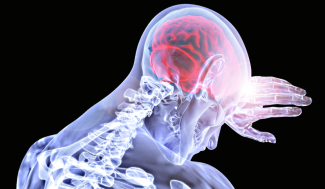Pain is a very subjective sensation. The same condition could be experienced as excruciatingly painful by some people, while others will consider it as barely painful. A study conducted by Leonie Koban, researcher in the team of Philippe Fossati and Liane Schmidt « Control – Interoception – Attention »at Paris Brain Institute, showed that pain experience is influenced by one’s own learning experience, but also, and even more strongly so, by information coming from other people. Brain imaging revealed that those two types of expectations—learned and social—were mediated through different brain networks. Results are published in Nature Communications.
Expectations influence our experiences. They can be generated from different sources. They can be based on what we have experienced or learned before, but also from what other people tell us. Positive comments on a restaurant or an exhibition will certainly modify your expectations on the said restaurant or exhibition. This is also true for sensations such as pain – think of medical procedures or events that are typically somewhat painful, such as childbirth. If others report a treatment or a procedure to be very or not very painful, it might influence one’s expectations about the procedure and also the experience of the pain itself. However, the mechanisms and brain systems involved remain unclear.
Leonie Koban and her collaborators employed two different stimuli to explore the effects of expectations on pain: a learning stimulus and a social stimulus. For the learning stimulus, they used a conditioning paradigm with one drawing of an animal and one drawing of a vehicle, each one predictive of a high or low pain stimulus. For the social stimulus, they showed the participants the pain ratings of other people, which could be either low or high on average, but did not predict the actual intensity of the upcoming pain stimulus. Then they applied painful heat different intensity. At the same time, they recorded brain activity using functional MRI.
« We knew before that expectations could influence pain but we didn’t really know how different sources of expectations might influence pain and whether different sources of expectations involve different brain mechanisms. We were actually really surprised that the social information had such a huge influence on how people experienced pain, much bigger than learning by one’s own experience. Initially, we had thought that people would quickly realize that the social information was not actually predictive of the heat intensity and that they would not be influenced by it anymore. However, this is not what we observed. Instead, social influence remained strong throughout the experiment, even when people were presented with more predictive information about the upcoming pain. » explains Leonie Koban
Furthermore, they show that the brain systems mediating social influence effects and the effects of learning on pain are different. Learning effects are mediated by limbic areas and posterior brain regions such as the hippocampus, whereas social effects are mediated by prefrontal and parietal areas. This could suggest that social information bypasses learning networks and directly recruits brain networks involved in top-down control and attention.
« Overall, these results show the importance of both social and learned expectations for pain, and they illustrate the neural mechanisms behind it. Understanding how expectations, whether they come from social context or learning, shape our behavior and experience is crucial as they have important consequences for well-being and health outcomes in real life. » concludes Leonie Koban
Sources
Different brain networks mediate the effects of social and conditioned expectations on pain.
https://www.ncbi.nlm.nih.gov/pubmed/31506426
Koban L, Jepma M, López-Solà M, Wager TD. Nat Commun. 2019 Sep 10.







